
Citizens' Military
Training Camp
(CMTC)

The 22nd Infantry at Camp Mc Clellan 1926
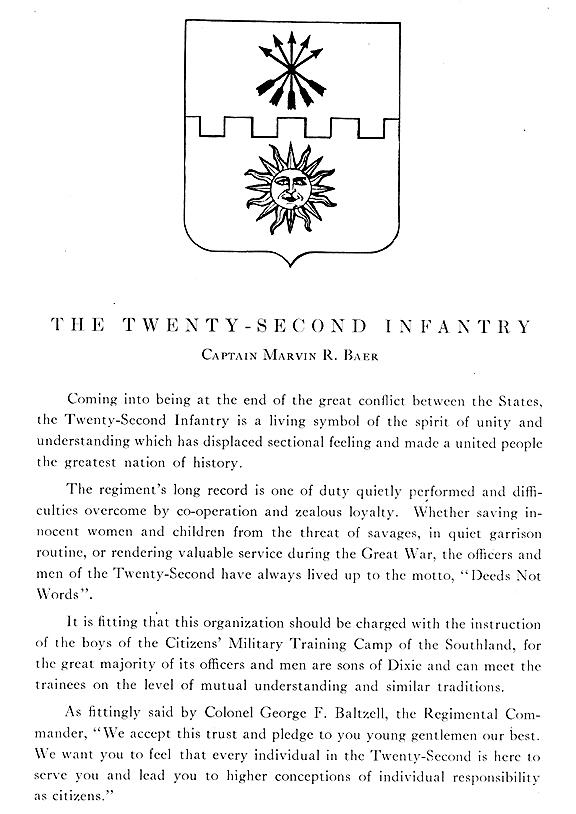
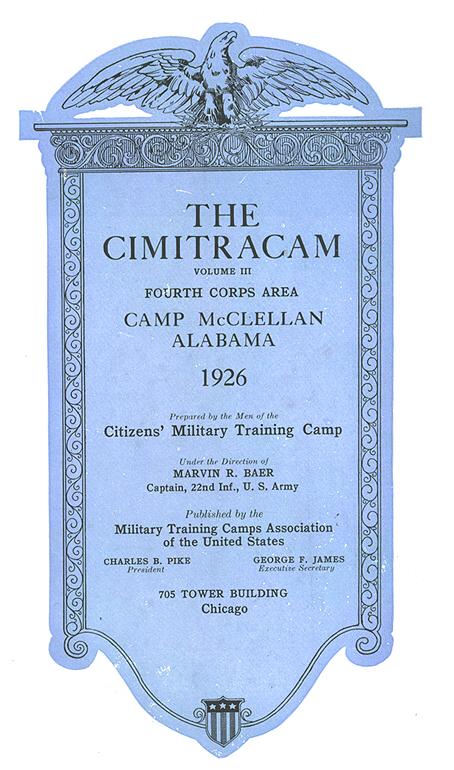
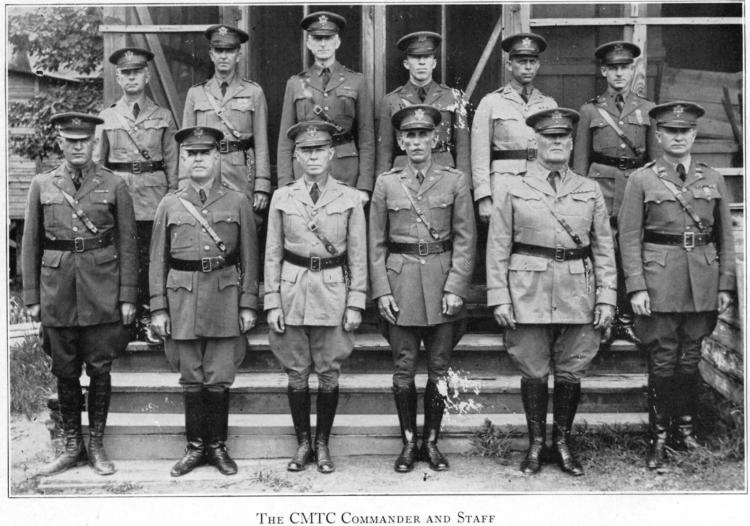
The CMTC staff for 1926
COL George F. Baltzell, Regimental Commander of the 22nd Infantry
and CMTC Commander, is in front, third from left
The following was written by Colonel Baltzell and published in The Cimitracam 1926:
THE PURPOSE OF THE CMTC
COLONEL GEORGE F. BALTZELL Commanding Twenty-Second Infantry
The CMTC at Camp McClellan has been a marked
success this summer. The number of students is less than last
year,
but the quality is very high and the earnestness, interest and
enthusiasm of these young men have been very marked.
These camps offer young men a wonderful chance to spend a month
in the great outdoors, doing a little military training,
getting an understanding of citizenship, and having much
opportunity for recreation and athletics of all kinds.
Military training is given only in its
rudiments. It is impossible within four weeks to develop a fixed
standard of training;
yet progress made in disciplinary drill is really remarkable. A
single instance will suffice. On the 5th day of the Camp the
Annual Visitors' Day
for the ROTC and CMTC was held. This day was near the conclusion
of the six weeks' period of training of the ROTC
and came at the very beginning of the CMTC. The Regimental Parade
held by the CMTC on its fifth day was marvelously well executed,
considering conditions. The steadiness in ranks, the marching and
the spirit shown by these young men under a situation of unusual
heat
railed forth the highest commendation.
A very important element in the training given
is citizenship. Undoubtedly, young men have little understanding
of our Government,
its operation and our military system and its purpose. Likewise,
they have thought little about the obligation of the citizen to
his community,
state and country. This subject has been given particular
attention and the fact has been impressed that the same qualities
which make the good citizen
also make the good soldier. Particular emphasis has been given to
the following truth: "Every good citizen realizes that for
what is given him by his Government,
he is obligated in turn to give to that Government full measure
for what he receives." The greatest opportunity for the
execution of the duties of citizenship
arises when the Government itself is threatened—that is in a
national military emergency.
There are many insidious influences in this
country strenuously exercised by very opposite types of people
and organizations.
These efforts extend from the low-minded "Reds" and I.
W. W.'s to those who are very high-minded religionists.
All these are based on a common purpose. The effect is just the
same, whether it be to destroy Government or to nullify
provisions of the Constitution,
which enable the Government to provide for the common defense. If
the young men, in the CMTC, can be made to realize their
obligations
to the Government—and the greatest obligation is to maintain
and preserve the country—a great national service will have
been done.
A youth capable of sound thinking must realize
the benefit obtained from the camps. There are maintained the
highest physical,
mental and moral standards; the atmosphere is clean, the work and
training are most wholesome, and if he and his friends will but
take stock of him
upon completion of the four weeks' stay, all are bound to
recognize the value that he has received. In addition, the young
man from the rural district
has an opportunity to meet and make friends in a way not
otherwise possible to him. He gets a knowledge of personal
hygiene and sanitation
which probably has never heretofore been given him to learn. The
effect on all the young men gathered together can be compared to
a trip,
by each, through the states and communities represented at these
camps, and the concentrated benefit is of course very great.
The success of a camp of this nature, where the
young men pay nothing for travel or maintenance, can only be
measured by comparing it
with the same camp held the succeeding year. If each young man
returns, or through his influence encourages others to come for
the first time,
then it can be assumed that this camp has had real value.
If the public at large will think of the
advantage that can be gained in one month by their sons through
such an experience,
Congress will be led to make the larger appropriations so much
needed.
**********************
Below are typical Company photos of CMTC student Companies for 1926
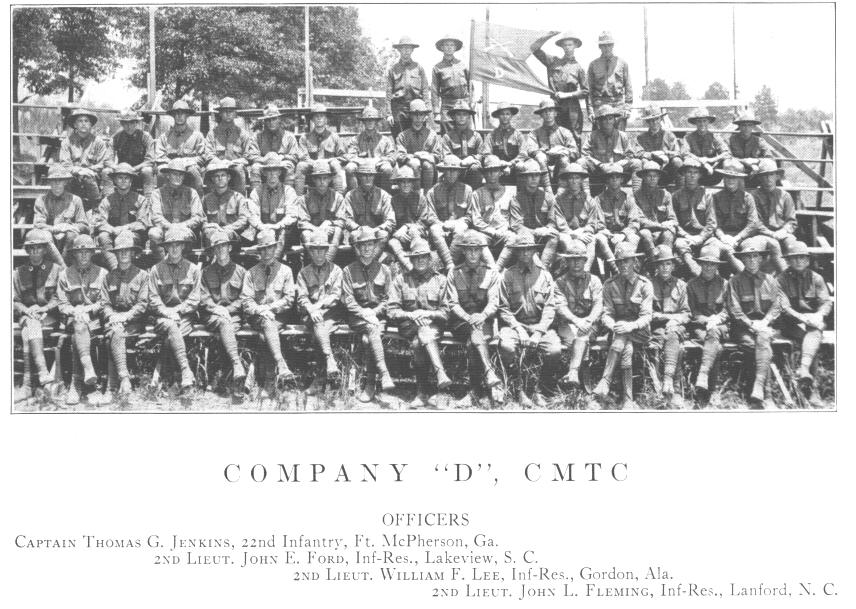
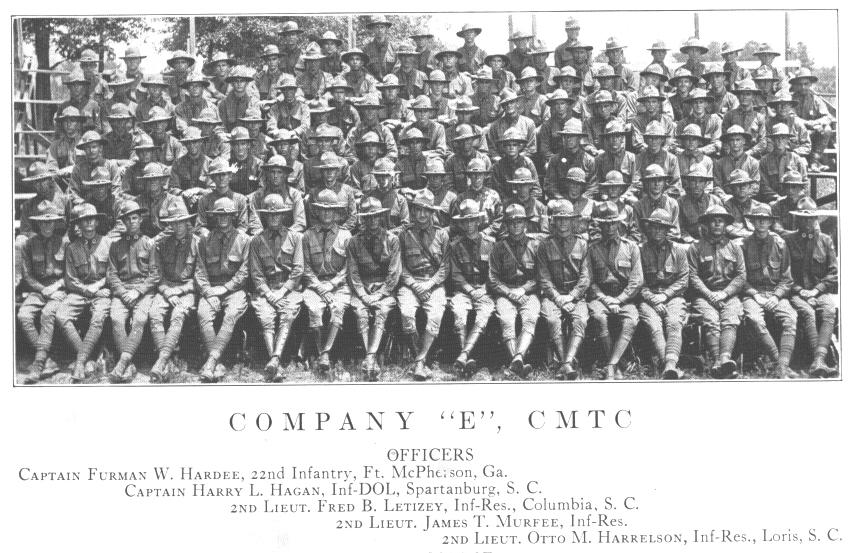
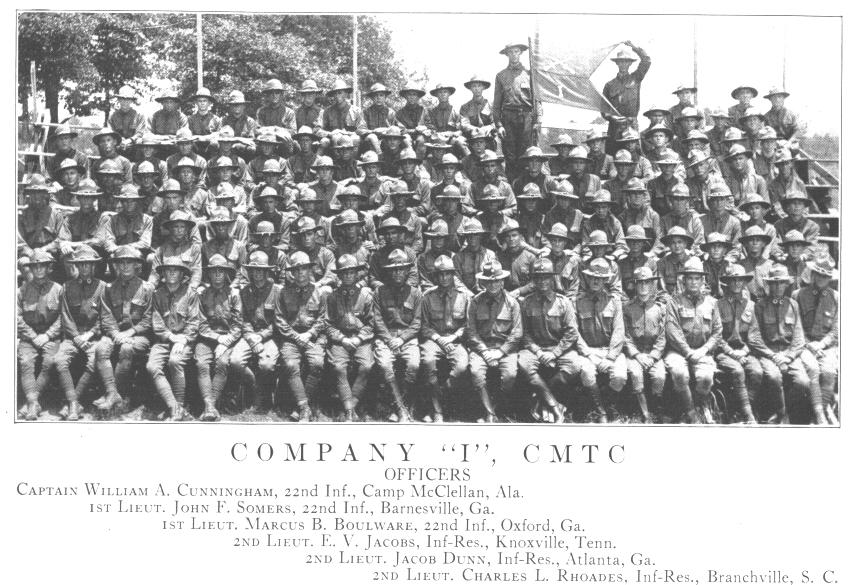
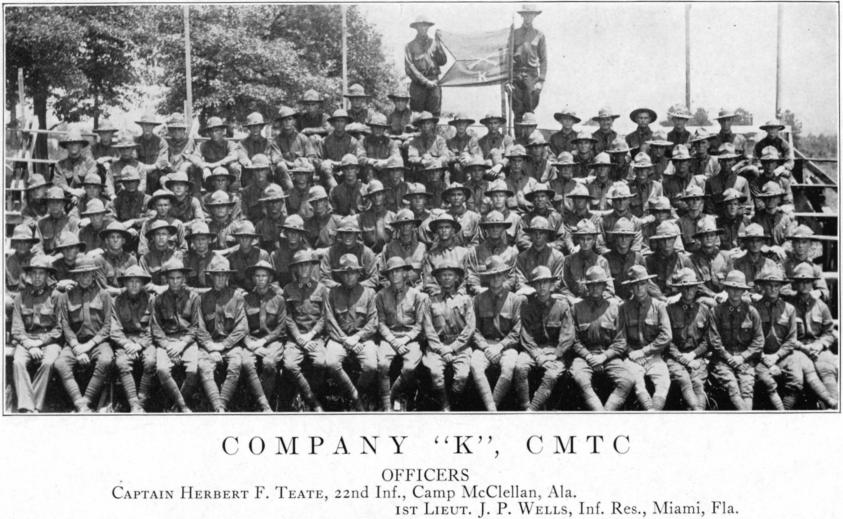
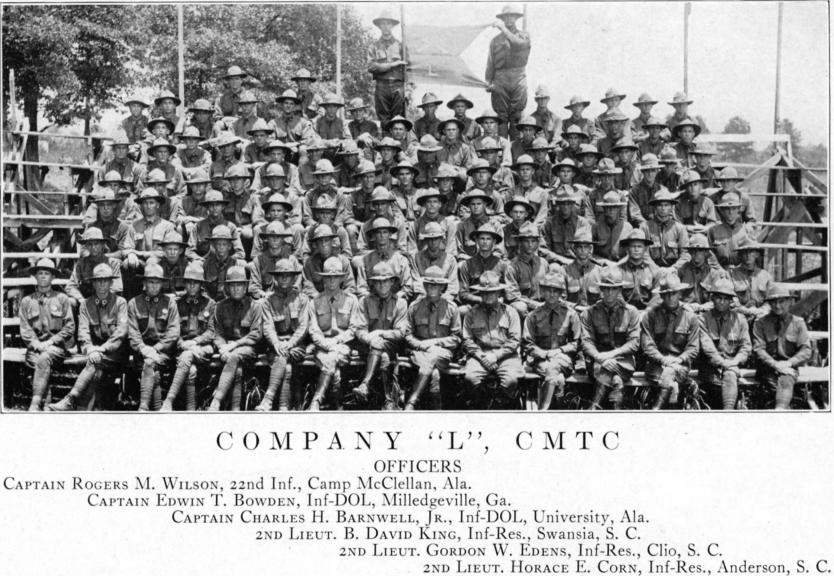
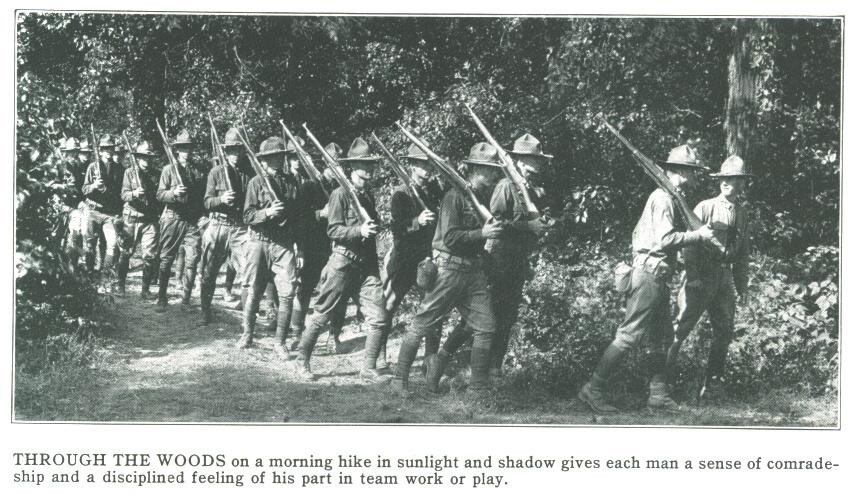
CMTC students on a field hike, wearing M1910 web belts with attached canteen.
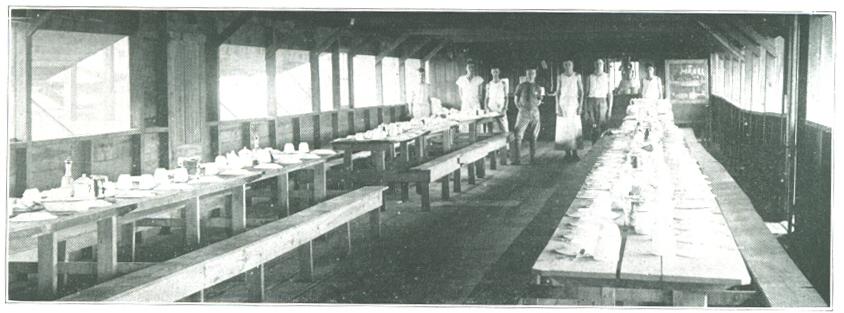
One of the typical mess halls for the students.
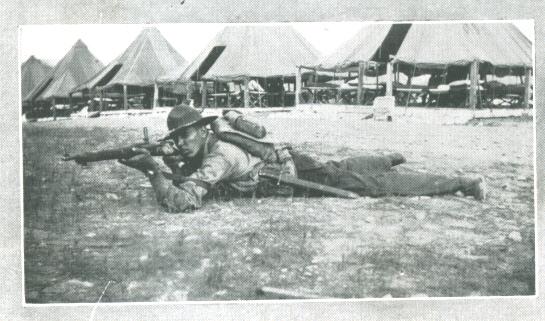
CMTC student in full field gear (M1910)
with his Springfield rifle (M1903)
Student living quarters (tents) are in the background.
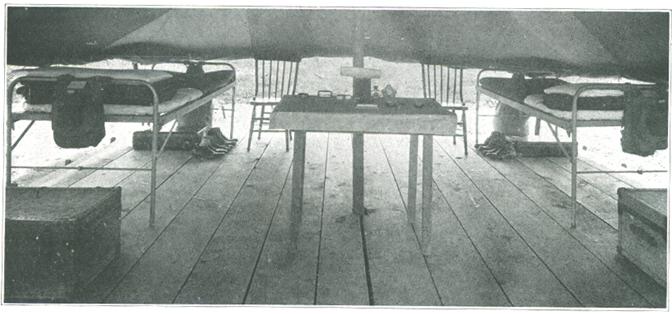
Interior view of tent in which CMTC students lived.
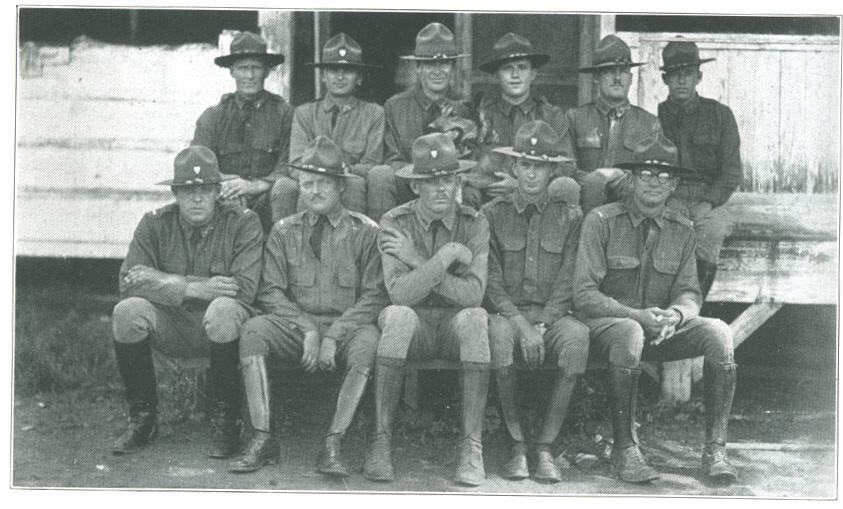
Ranking second only in importance to
military training was athletics.
Each student Company was assigned an athletic officer, some of
which gathered together for the above photo.
Four of the officers are wearing 22nd Infantry Distinctive
Insignia on their campaign hats.
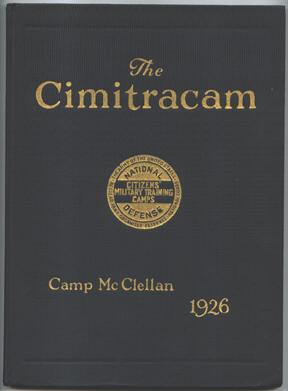
Annual (yearbook) for the CMTC 1926
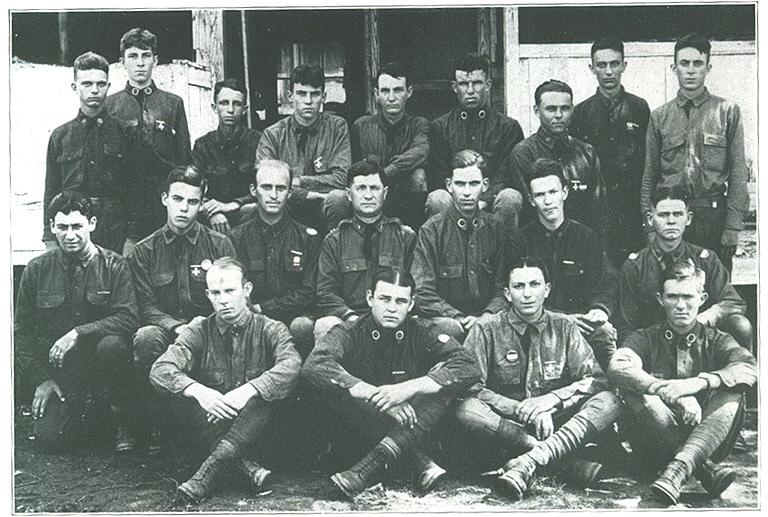
Staff for the 1926 Annual
CPT Marvin R. Baer, 22nd Infantry, Officer-in-Charge for the
Annual
is in the center of the 2nd row.
Enamelled badge for the CMTC Several of the students in the
photo above Student seated, front row,
second from the right |
|
In the 1926 Cimitracam Lewis Lefkoff, a student of Company H wrote:
This company organized on July 9 was known as
the best all-round machine gun company at camp. Captain I.
C.Nicholas, Infantry DOL,
Company Commander, was assisted by Lieutenant Parsons and
Sergeant Tidesco, of the 22nd Infantry, our 1st sergeant,
a good baseball man, but when it came to position, the "top
kick".
We were very efficiently sponsored during the
whole training camp by the Twenty-Second Infantry from Fort
McPherson, Georgia.
In the heart of every man of Company "H" there beats a
pounding pulse of appreciation for the splendid training and the
pleasant summer
afforded them by the CMTC and the grand old Twenty-Second.
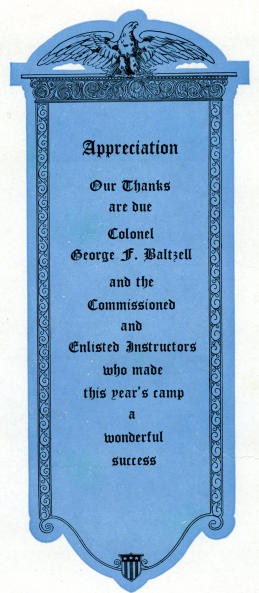
Plate in the 1926 Cimitracam thanking Colonel Baltzell ( Commanding Officer 22nd Infantry )
Home | Photos | Battles & History | Current |
Rosters & Reports | Medal of Honor | Killed
in Action |
Personnel Locator | Commanders | Station
List | Campaigns |
Honors | Insignia & Memorabilia | 4-42
Artillery | Taps |
What's New | Editorial | Links |